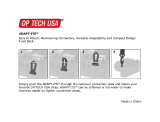Environment
10 Dell EMC PowerVault ME4024 and VMware Horizon View with 1,300 Persistent VDI Users | 3919-RA-VDI
Horizon has several components that make up the product:
Connection Server: The Connection Server is the central hub for managing connections. Users connect
using either the Horizon View client or a web browser. The Connection Server then connects the user to the
proper virtual desktop session based on the assignments. Users can either be assigned a static machine (in
this case, for persistence) or given a random machine in a non-persistent environment.
Composer: The Horizon View Composer server handles the tasks of provisioning virtual desktops to the
proper pool using the correct base image. It also handles maintenance tasks, such as a desktop refresh or
recompose.
Horizon View agent: Installed on user devices, the Horizon View agent provides users with quick, secure,
multi-protocol access to documents, applications, and desktops from any of the user's devices including
smartphones, tablets, and PCs. VMware Horizon provides on-demand access to Windows, web, and
Software as a Service (SaaS) applications.
Management console: The Horizon View management console is a web service application that can be run
from any Windows server in the environment. The management servers used were configured using VMware
vCenter™ 6.7 with a central Microsoft SQL Server
®
2016 instance. There was one management server
configured controlling all 1,300 virtual machines.
3.2.3.1 Linked clones
The virtual machines were created using the linked clone method in Horizon View. This provides efficient use
of space and simplifies management. By using linked clones, a replica image is used for shared data resulting
in a very small footprint. After cloning, the total space consumed is less than 2 GB/VM in a persistent state
before user login with the VMs running.
After the user profiles were created, the VMs each consumed approximately 5 GB of space. This includes the
user customizations, page file, memory swap file, and changes made to customize each VM to the assigned
user. Each VM runs Microsoft Office 2013, Adobe
®
Acrobat
®
Reader
®
, and a mix of Login VSI applications
Virtual desktops are assigned to the same user every time with desktop persistence. All changes made by a
user are retained for future sessions. The changes are stored in a delta VMDK stored with the VM.
All the desktops are in an automated desktop pool with dedicated user assignments. Those desktops are
based on a master desktop template, which is selected when the pool is created. This ensures each user gets
a dedicated machine they can customize.
Horizon View also supports creating non-persistent environments to streamline support and troubleshooting.
These desktops automatically revert to the default configuration upon user logoff.
3.2.4 Microsoft Windows 10
Each of the desktops was a Windows 10 Enterprise client. Windows 10 64-bit was chosen for this
configuration. All patches were applied to the desktop image before the base replica was created.
Some Windows components were disabled to reduce resource requirements, in accordance with best
practices. In each desktop, indexing was disabled, the frequency of Windows updates was limited, and the
pagefile and temporary files were redirected to a separate volume. All disk traffic was captured during the test
runs.





















